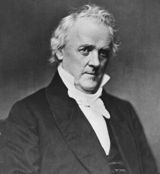James Buchanan was the 15th President of the United States. James Buchanan is best known as the last president before the start of the Civil War. He tried to stop the war, but many of his policies further divided the Union.
| Served as President | 1857-1861 |
| Vice President | John Cabell Breckinridge |
| Party | Democrat |
| Age at inauguration | 65 |
| Born | April 23, 1791 in Cove Gap near Mercersburg, Pennsylvania |
| Died | June 1, 1868 in Lancaster, Pennsylvania |
| Married | He was never married |
| Children | none |
| Nickname | Ten-Cent Jimmy |

James attended Dickinson College in Carlisle, Pennsylvania. At one point, he got into big trouble and nearly got expelled from college. He begged pardon and was given a second chance. He used this opportunity to complete his studies with honors.
After college, James attended law school. He passed the bar exam and became a lawyer in 1812. Buchanan’s interests soon turned to politics. His strong legal knowledge and skill as a debater made him an excellent candidate.
Buchanan’s first public office was as a member of the Pennsylvania House of Representatives. A few years later, he was elected to the United States House of Representatives, where he served for many years.
Buchanan continued his long career in various political positions. During President Andrew Jackson’s presidency, Buchanan became US Secretary of State for Russia. After returning from Russia, he ran for Senate and served in the United States Senate for over a decade. as James K Polk was elected president and Buchanan became secretary of state. He served as U.S. Ambassador to the United Kingdom under President Pierce.
In 1856, Buchanan was nominated for president by the Democrats. Perhaps he was chosen because he was out of the country during the Kansas-Nebraska dispute over slavery. As a result, he was not forced to choose sides and make enemies in the matter.
Shortly after Buchanan became president, the Supreme Court ruled on Dred Scott. The ruling said the federal government had no right to limit slavery within the territory. Buchanan believed his problem was solved. If the Supreme Court decides, everyone will follow it. But the people of the North were outraged. They wanted slavery to end regardless of the Supreme Court ruling.
Although Buchanan was personally against slavery, he was a strong believer in the law. He also wanted to avoid civil war at all costs. He supported Dred Scott’s judgment. He even went so far as to support pro-slavery groups in Kansas, believing they were on the right side of the law. This attitude further divided the country.
On December 20, 1860, South Carolina seceded from the Union. Several other states followed suit and established their own country, the Confederate States of America. Buchanan did nothing. He didn’t think the federal government had the right to stop them.
Buchanan happily resigned from the presidency and retired. He told Abraham Lincoln that he left the White House as “the happiest man alive.”
Buchanan is considered by many to be one of the weakest presidents in US history. His indecision and willingness to cooperate with the division of the country was a major factor in sparking the civil war.
Buchanan retired to his mansion in Pennsylvania and died of pneumonia in 1868.
He was the only president who never married. His niece Harriet Lane served as First Lady during her time at the White House.
She became so popular that she earned the nickname “Queen of Democracy”.
His childhood home in Mercersburg, Pennsylvania was later converted into a hotel called the James Buchanan Hotel.
He was often referred to as “the face of the dough”, implying that he was a Northerner who favored Southern opinions.
He was once offered a seat on the Supreme Court.
One of his goals was to buy Cuba from Spain, but he never succeeded.

